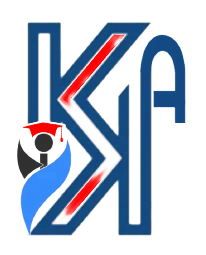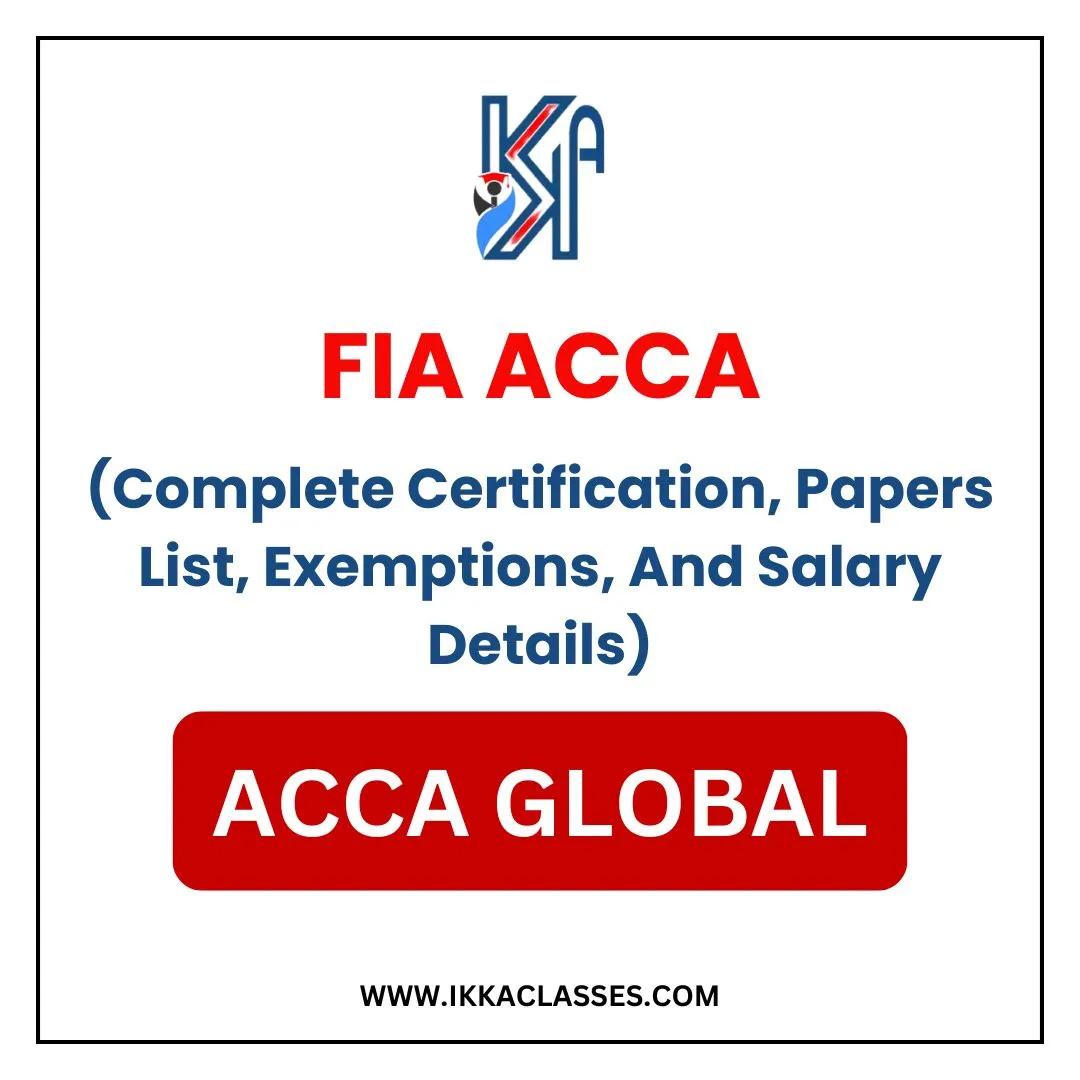Not sure where to start your accounting journey?
FIA ACCA is one of the most accessible routes into finance – especially if you are fresh out of school or switching careers. It’s flexible, beginner-friendly, and helps you build real-world accounting skills from the ground up.
This blog breaks down what the course includes, who it’s for, and how it connects to the full ACCA qualification.
But first, let us start by understanding what is FIA in ACCA.
Table of Contents
ToggleWhat Is FIA ACCA?
Before jumping into the full ACCA qualification, many students start with FIA ACCA — short for Foundations in Accountancy.
It’s an entry-level route designed by ACCA. It is suitable for anyone who wants to build strong accounting fundamentals. Here’s what makes it different:
- It focuses on practical, job-ready skills — not just theory
- You don’t need any prior commerce or finance background
- It’s a modular course, so you can study and earn certifications in stages
- Available globally and recognised across industries
Lets you skip early ACCA papers and jump directly into advanced levels
What Is FIA Certification?
FIA certification is an entry gate to ACCA qualification offered by ACCA Global. It is ideal for:
- Students without traditional qualifications.
- Anyone unsure if they meet ACCA entry requirements.
Depending on how far you go in the FIA route, you can receive:
- Introductory Certificate in Financial and Management Accounting
- Intermediate Certificate in Financial and Management Accounting
- Diploma in Accounting and Business
Each certificate confirms your skills in areas like bookkeeping, financial reporting, and business understanding. They’re valuable on their own, even if you decide not to move forward with full ACCA.

What Is The Difference Between FIA And ACCA?
Points of Difference | FIA | ACCA |
Level | Entry-level foundation | Professional qualification |
Entry Requirements | No formal education required | 10+2 or relevant degree (or through FIA) |
Age Eligibility | 16+ | Typically 18+ or post-school |
Structure | Modular (7–9 exams + ethics module) | 13 papers + ethics + experience |
Duration | 12–18 months (average) | 2–3 years (with work experience) |
Leads To | Direct entry into ACCA core levels | Membership and global finance opportunities |
What Is The ACCA FIA Route And Its Benefits?
By now you must know how the FIA ACCA route lets you build knowledge in stages and step into the ACCA qualification with exemptions. So, here’s how the full journey works:
- You start with FIA (no entry requirements)
- Complete the 3 levels.
- Get exemptions from ACCA’s Applied Knowledge level
- Move directly to the ACCA Skill level and beyond
- Complete ethics module + practical experience
- Apply for ACCA membership
You gain the following benefits:
- Study at your own pace — full-time or part-time
- Exit anytime with a recognised certificate or diploma
- Direct transition into ACCA
- You gain the foundational knowledge to ace ACCA exams.
- Available online or through approved learning partners
- Edge over other candidates in the job market.
What Is Included In The FIA ACCA Course Structure?
The ACCA FIA course follows a modular structure, which means you progress through different levels as you complete each set of exams.
FIA includes three main certifications: Introductory, Intermediate, and Diploma in Accounting and Business. Each certification builds your skills gradually, helping you prepare for real-world finance roles or move ahead to the full ACCA course.
What Are The Subjects In The FIA ACCA Syllabus?
Paper | What It Covers |
FA1 | Basic accounting entries and double entry system |
MA1 | Costing, budgeting, and basic decision-making data |
FA2 | More detailed accounts and bookkeeping processes |
MA2 | Deeper cost control and finance planning |
FAB (BT) | Role of accounting in business and ethics |
FMA (MA) | Planning, control, and performance measurement |
FFA (FA) | Financial statements and reporting frameworks |
Why Should You Study The FIA ACCA Course?
Here are some reasons to convince you to study the FIA ACCA Course:
- No entry barriers – Open to high school students
- Flexible learning pace – Suitable for both full-time and part-time learners
- Global relevance – Recognised by employers and institutions worldwide
- Fast-track to ACCA – Grants direct access to ACCA qualification

Is FIA A Diploma Or A Degree?
The Foundations in Accountancy (FIA) is not a degree. Instead, it’s a suite of qualifications designed to help students build practical skills in accounting and finance. Within the FIA path, you will find several certificates, which we will discuss next:
What Are The Qualifications Offered Under FIA?
The FIA qualification includes three main levels. Each one builds on the last, helping you move step by step into more advanced finance topics.
1. Introductory Certificate in Financial and Management Accounting
- FA1: Recording Financial Transactions
- MA1: Management Information
2. Intermediate Certificate in Financial and Management Accounting
- FA2: Maintaining Financial Records
- MA2: Managing Costs and Finance
3. Diploma in Accounting and Business
- Business and Technology (BT/FAB)
- Management Accounting (MA/FMA)
- Financial Accounting (FA/FFA)
How Many Papers Are In The FIA ACCA Exam?
The FIA ACCA course typically includes nine papers in total. However, the exact number can vary depending on the route you take and any exemptions you may receive.
The papers are divided into three levels as we discussed above. After completing the seven subjects of these levels, you also take:
- Foundations in Professionalism (an ethics module)
Foundations in Taxation or a relevant specialist paper

How Long Does The FIA ACCA Qualification Take?
On average, students clear the full set of FIA ACCA subjects in about 12 to 18 months. But it really depends on your pace.
- Full-time learners often pass exams within a year
- Working professionals or part-time students may take a bit longer
Who Is Eligible For The FIA ACCA Exam?
One of the reasons the FIA ACCA course is popular is because it doesn’t have strict entry requirements. You don’t need a commerce background or prior qualifications in finance to start.
Anyone aged 16 or older can enroll, making it also accessible to:
- School leavers who want to build a career in finance early
- Students who didn’t take accounting in school
- Working professionals or career changers looking to switch to finance
What Is The Minimum Age To Enroll In FIA ACCA?
If you are thinking to enroll in ACCA through the FIA route, then you can be as young as 16 years. Now, while there is no upper limit, but the FIA program is specifically designed for individuals who are starting their journey in accounting and business.
To verify your eligibility during the ACCA FIA certificate process, you may be asked to provide:
- A valid ID (like a passport or government-issued document)
- Proof of your latest academic level or school certificate
Who Can Apply For An FIA License Or Certification?
To receive an official FIA certificate or licence, students must:
- Pass all required FIA ACCA subjects
- Complete the online Ethics and Professional Skills module
- Finish any supporting documents or verification steps
The process is mostly online. Once you’re done with exams and meet the basic criteria, you can apply through ACCA’s official website.

What Are The Best Books For FIA ACCA Preparation?
When it comes to cracking the FIA ACCA syllabus, the right study material can make a big difference. While attending classes or watching lectures can help, having a solid book by your side keeps you grounded.
You can find the best FIA ACCA books on online marketplaces like Amazon, FlipKart or publisher websites like Kalplan Publications, BPP Learning Media, and Learnsignal. Some local bookstores and online coaching centres also stock them.
Note: Always try to get the latest edition. If that’s not possible, make sure the book is no more than 1 to 2 years old.
What Is The Average Salary Of FIA Professionals In India?
The average starting salary range of professionals who have completed the Foundations in Accountancy (FIA) course in India falls between ₹3 to ₹5 lakhs per year. Now this is an average starting range. It can go high to ₹8 – 10 lakhs per annum as well. It all depends on your job role, location, and the kind of company you join.
Having said that, not all FIA jobs pay the same.
If You Join an MNC
- They offer around ₹4 to ₹6 LPA
- Also provide learning support, health cover, team lunches
- But you will bear more work pressure and have a compromised work-life balance
- Good for: Stability, long-term growth, and clearer career ladders
If You Start with a Startup
- Salaries may start low at ₹2.5 to ₹4 LPA
- You might not get cushy benefits, but there will be flexible working hours
- It’s fast-paced, less rigid, and good for those who want to learn by doing.
If you work at mid-sized accounting firms
- Usually offer ₹3 to ₹5 LPA
- If you’re aiming for ACCA later, this is great exposure
- Expect a lot of client interaction and real finance work from day one

What Is The Salary Of FIA Employees In Government Or Private Sector?
From startups, and MNCs to mid-sized firms, FIA professionals can find work in both public and private sectors. However, the pay and growth paths can differ quite a bit. Here’s how –
Government Sector
- Entry-level salaries often fall around ₹2.5 to ₹4 LPA
- Job security and benefits like pensions, allowances, and leave are a major plus
- Promotions are typically time-based, not performance-based
Private Sector
- Offers a wider salary range from ₹4 to ₹6 LPA for freshers
- Growth is performance-driven, with quicker salary hikes possible
If you are FIA ACCA then you can push your salary higher over time
Frequently Asked Questions About FIA ACCA
Can I Do ACCA After FIA?
Yes, you can move to ACCA qualification upon completion of FIA (Foundations in Accountancy) by filing the re-registration application form.
What Is FIA In ACCA?
The FIA in ACCA stands for the Foundation in Accountancy. It’s a beginner-friendly course designed for people who want to start a career in accounting and finance.

